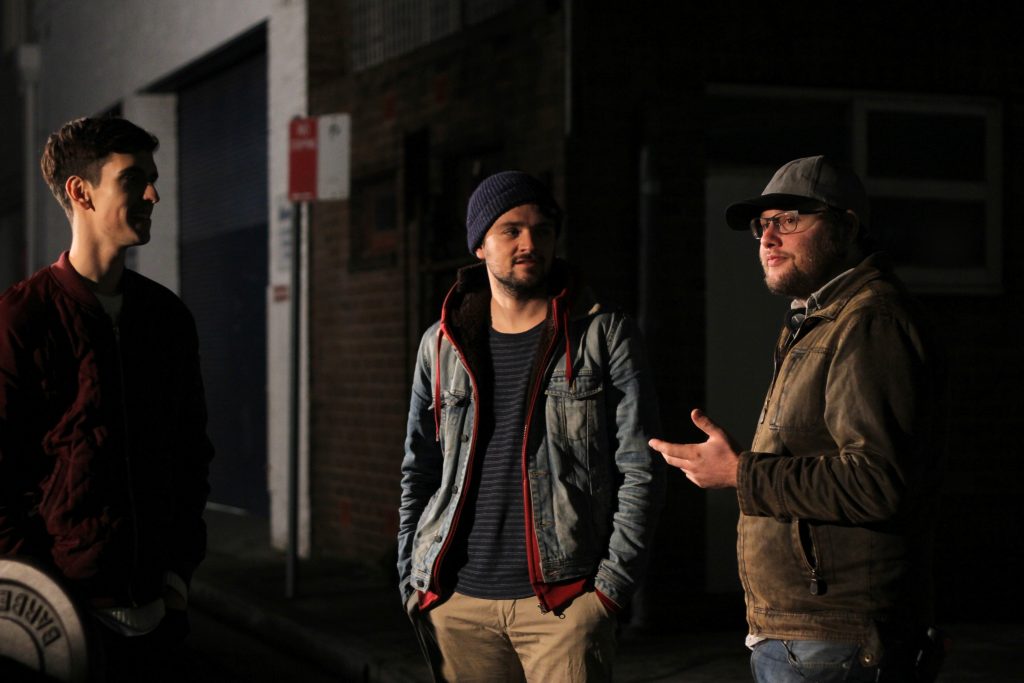
Joshua on the set of Staying the Night
Before I begin, I’ll state the obvious: a series of blog posts can’t cover the breadth nor depth of this topic, so I’m going to look at bits and bobs in a series of posts.
There’s a thousand moving parts being a short-form director, millions when working long-form, but one constant is the importance of working with actors to create a performance. As directors we all have moments we’re proud of, moment’s we’ve failed and times we rushed when we should have fought for more time. Along with a great many other ups and downs.
Directing, for me, is the space where I feel most at ease. Connecting with actors, finding meaning and pursuing emotional and narrative outcomes are my favourite thing to do.
As a director who has most frequently directed his own scripts I find it necessary to follow what I call the ‘silo method’, where at each stage of production I separate myself from the previous role… writer, director, and whatever I’m doing in post. This may seem an aside to the topic, but I find it’s extremely helpful to divide egos if you’re playing multiple roles; the director and actors must always be able to pull from the script in isolation, and if you’re still a vulnerable writer protecting their words I personally don’t believe you can be giving actors the environment they need.
That’s a huge part of the job: creating the environment actors needs to do the work. There’s an understanding that should be inherent to the relationship between a director and their cast, one where the actor is safe to be vulnerable and find their way to the performance. When an actor is acting they aren’t pretending, they’re experiencing those emotions as another person. However crude a description, that’s how I prefer to think of it. It means that wherever they go in a scene I, as director, need to be constantly aware that as I ask more of them, iterate on performance – provide notes – I am asking a person who is actually in the middle of an argument, moment of loss, exhilaration, frustration – and on and on.
It is using fiction to tell an emotional truth, through which the audience will make an emotional connection.
It must be said, by the way, a good crew will be a huge factor in creating the environment required. Whatever department a conscientious crew knows how to be supportive of good performances. Regardless, a set has leaders in the form of producer/s, production management, Assistant Directors and the Director, along with heads for respective departments; they will play a huge role in setting the workplace atmosphere.
As director I always have the words of a fictional character echo in my mind when I’m on set. In E.R., when Dr. Greene finishes his final shift he imparts a wisdom to his former intern, Dr. Carter: “you set the tone.”
This is something a director should always be conscious of.
The tone of the set can, and should, fluctuate. The constants are a healthy and safe work environment (themselves set by a ‘workplace tone’ as with any other job), but the tone can shift depending on the work. I’ll keep an upbeat mood, maybe play some music and constantly have snacks in my hand if the scene is light. I’ll have a laugh with the cast and take the piss out of the script (if it’s my own) during blocking and rehearsals. High energy is the tone I’m worst at, on a personal level, so it’s something I’m extremely conscious of on set.
If it’s a sombre scene it’ll be totally different, and I’ll ask the AD to make sure everyone speaks softly and gives the cast space as best they can. It’s not that I approach scenes of different nature with different levels of seriousness, it’s about what’s needed to set the tone.
When the tone is right you can get into working the scene in a space where the talent can detach from the chaos that is a film set. Actors have to be at their most vulnerable in what is potentially the most uncomfortable environment imaginable: everyone looking and listening to your every word, action, breath.
One final point I’ll make is, when talking set horror stories, one phrase comes up fairly often: I don’t care. It’s possible to reach terribly low points as a director, but two things must appear to remain constant to your cast and crew: confidence in decision making and care. Never, ever say you don’t care. If you don’t care why should anyone else? If you don’t care about one thing, what else don’t you care about? Don’t dismiss cast or crew with apathy. Don’t be selective in your care; don’t care about camera department because you love cameras, but be apathetic toward make-up. Always make the effort to show you care, because if filmmaking is one thing it’s collaboration.
It’s not that I’ve never done any of the things I’d deem mistakes — I have, but learned from them. I’ve noted when my actions have affected the mood on set, the quality of performances. I’ve noticed that when an entire cast and crew are looking to you — for answers, leadership, decisions, compassion and acknowledgement of their hard work — the director sets the tone.
Joshua Lundberg is a Writer and Director at Barking Mouse®, and co-Founder along with Producer Georgia Woodward. Together they create films, web series as well as commercial and corporate content for clients.
